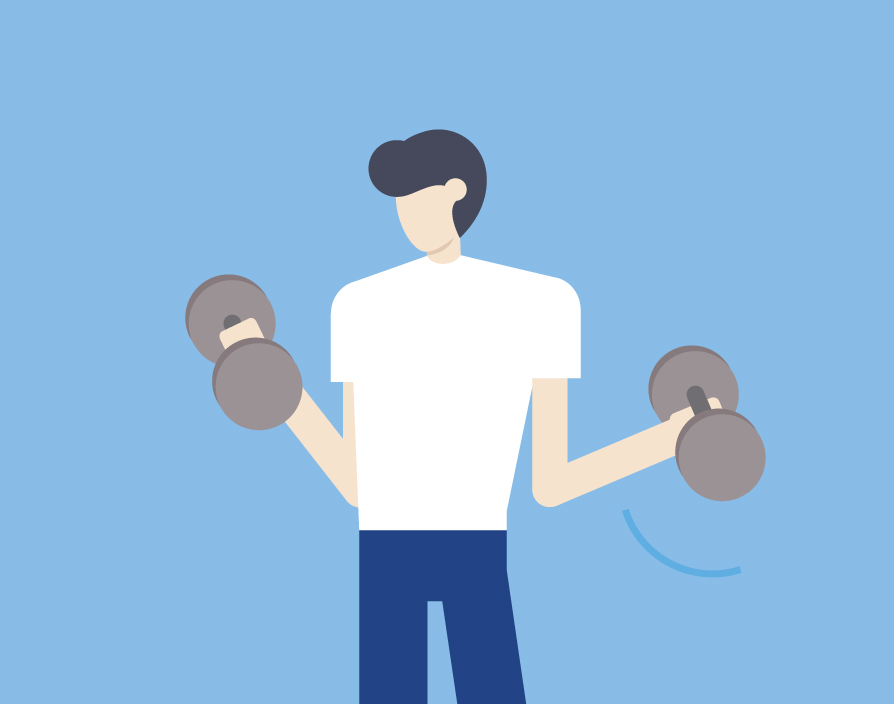Entrepreneurs seemingly face an impossible choice between succeeding professionally or staying healthy. On the one hand, small-business owners have to dedicate every waking hour to their company or risk failure. On the other hand, if they don’t take time off to care for themselves, founders could see their overall health get flushed down the toilet. This is a dilemma Angela Middleton, founder and chairman of MiddletonMurray, the apprenticeships and training provider, faced a while back after running her business for a few years. “I’d gone from looking fit to feeling overweight and heavy with a roll around my stomach and I wasn’t happy about it,” she says. Deciding to stop burning the candle at both ends, she devoted herself to an intense weight-lifting regimen and low-calorie diet, which soon bore fruit. Not only did she find herself sporting a six-pack at age 55 but also noted a clear boost in her performance. “I’m more energetic, normally wake up before my alarm and feel more awake,” she says.
And Middleton is hardly alone in feeling like she had to choose between her company and her personal health. “It’s a catch-22 problem because CEOs are at the peak of their careers and are extremely time poor, putting in long hours at the office,” says Keith McNiven, founder of Right Path Fitness, the personal-training company. “But these are the people who benefit the most from exercise.” Indeed, a study published in the Journal of Occupational & Environmental Medicine showed that simply adding two and a half hours of exercise per week can significantly boost productivity and decrease sickness absence. “When you don’t feel 100%, you don’t perform at 100%,” McNiven says. “It’s as simple as that.”
However, taking the time to hit the gym doesn’t come easy for every entrepreneur. “I’ve worked with clients in the past who see it as a something of a badge of honour not to have the time to exercise,” says McNiven. “They are just working themselves into the ground and seem almost proud of it.” Unfortunately, establishing a culture encouraging entrepreneurs to emulate Elon Musk’s insane 100-hour work week can leave founders facing the risk of burning out before making their startup a success. This danger can be quite significant as 78% of entrepreneurs suffer from some sort of mental health issue, according to a study by researchers at University of California Berkeley and University of California San Francisco. Given the detrimental effect long hours at the office could have on your health, taking time off can ensure you can stay in the game for longer. “Like a car, your body can only take neglect and inattention for so long before it starts breaking down,” says McNiven. “Prevention is always better.”
But even if founders want to keep up their physical maintenance, their shareholders may be opposed to the idea. “It’s a widespread view that if the CEO is not in the office it means they aren’t working,” says Peter Limbach, assistant professor of finance at the University of Cologne and Centre for Financial Research. This assumption is evident in a forthcoming study in the Review of Financial Studies, which suggests that the more a business leader golfs, the worse results their firms have. “This implies that that if the CEO is in the office, it’s better for the shareholders,” Limbach says.
However, he’s found himself wondering if this widespread view is accurate. A self-confessed sports enthusiast who has experienced the benefits of staying active himself, he challenged this view in his own study. Limbach found that not only did the number of CEOs running marathons double between 2001 and 2011 but also that their participation in these endurance events benefitted their business. “On average their companies’ stock price jumped by 1% in the days around their participation,” Limbach says. “And we didn’t see any other reason for this systematic increase.” Moreover, he and his research partner noted that these companies were performing well overall and that professional mutual-fund investors were more likely to buy shares from companies that had a marathon-finisher as a CEO. “So the pros actually outweighs the cons,” says Limbach. In other words, while hours spent teeing off may be bad for business, participating in endurance events that require a high-level of fitness may be good news. So when it comes to sports, it might be better to emulate Mark Zuckerberg rather than Donald Trump.
Given the benefits in productivity, it’s hardly surprising that firms’ stock increases if their leaders maintain a healthy lifestyle. Even more encouragingly, working out can also help founders grow their networks. “Nearly everybody that I speak to now wants to talk to me about my fitness and health routine,” says Middleton. Other business leaders have also used their workouts to bond with others. For instance, the former Twitter CEO Dick Costolo is known to go cycling with the Yahoo executive Dylan Casey. “It’s very much a talking point,” says Middleton. “It’s definitely a conversation starter.”
Additionally, it’s not just entrepreneurs’ external relationships that can benefit from this new commitment to staying healthy. Incorporating it into their startup’s culture could also help establish strong bonds within the company. “Last year we did a bit of a boot camp,” says Henrik Torstensson, CEO and co-founder of Lifesum, the fitness app. For four weeks, everyone at the startup got to test activities like CrossFit, outdoor training and cycling classes twice a week. “It was just after we’d had a bit of a hiring spree where quite a few new people joined the company,” says Torstensson. “It really helped us build and establish relationships across teams.”

Empowering employees to take care of themselves could also mean making gains in retention and overall work satisfaction. “If you don’t promote healthier lifestyles you could risk staff feeling demotivated and unhappy,” says Lee Biggins, founder and managing director at CV-Library, the job board. And this risk is very real. Having surveyed 1,200 professionals across the UK, CV-Library, recently revealed that 29.1% felt that their jobs were making them fat and three-quarters felt unhappy as a result. “There are two aspects to this,” says Biggins. “Firstly, despite those out there trying to promote positive body images, it’s often true that weight gain can have a negative effect on our self-esteem. And not only this but eating unhealthy food and doing little exercise can leave you feeling sluggish and fatigued, [which] in turn can result in feelings of unhappiness or lack of motivation.” Clearly, there are advantages to promoting a healthy lifestyle across your startup.
Ultimately though, the main benefit of staying healthy is that it ensures founders can go that extra mile even when things get hard. “Remember building a company is a marathon and not a sprint,” says Torstensson. “It’s extremely fun and even intoxicating at its best but it also means a lot of work as things don’t always go exactly to plan.” And when things go wrong, maintaining a healthy routine can ensure that entrepreneurs go the distance. “If you are able to stay healthy, you’ll have more energy, be able to work harder, keep your smarts up and be more creative,” concludes Torstensson.
Michael Foote, founder, Quote Goat
I’m a big advocate for staying fit and how much impact it has for entrepreneurs and their businesses. I try to do at least half an hour of strenuous exercise each day. I’ve noticed a significant difference in my productivity after doing so. When I first launched my business I worked long hours every day, sacrificed exercise time and replaced it with time behind the desk. Exercise gives a clear mind and therefore, although I spend less time behind the desk, I believe I am more productive as a result.
Lee Dentith, CEO and founder, Now Healthcare Group
Keeping fit and healthy is vital to my mental and physical wellbeing. I usually get to the gym at 6am and after an hour working out I feel ready for the day ahead. It keeps me focused, driven and enable me to maintain an entrepreneurial spirit and drive. We all know exercise releases endorphins and as a CEO of a fast-growing health business, I attribute exercise to helping me to maintain focus and giving me the energy to deal with any challenge the day offers.
Sanjeev Virdi, founder, we:bo
Having played hockey internationally, studied psychology and sports science at university and worked in high-performing organisations for nearly 20 years, I’ve experienced first hand how being physically fit has made me more resilient, more alert, enabled me to manage stressful situations and make better decisions. Finding the time to fit in regular high-quality exercise is a challenge. Keeping myself fit and healthy requires motivation, commitment and a willingness to accept help from specialists. I believe these behaviours are also fundamental to being a successful leader.
Keith McNiven, founder, Right Path Fitness
In my younger years I competed for England in wrestling, so fitness has always been extremely important. Training remained a huge part of my life even when I stopped competing. When I started Right Path Fitness those habits came with me, not only because of the industry I’m in but also because I believe strongly in the power of exercise for physical, mental and emotional wellbeing. Fitness and business are alike in that they both require discipline and determination to see results. Keeping fit puts me in the right place to make my business work. ![]()
Share via:


















































